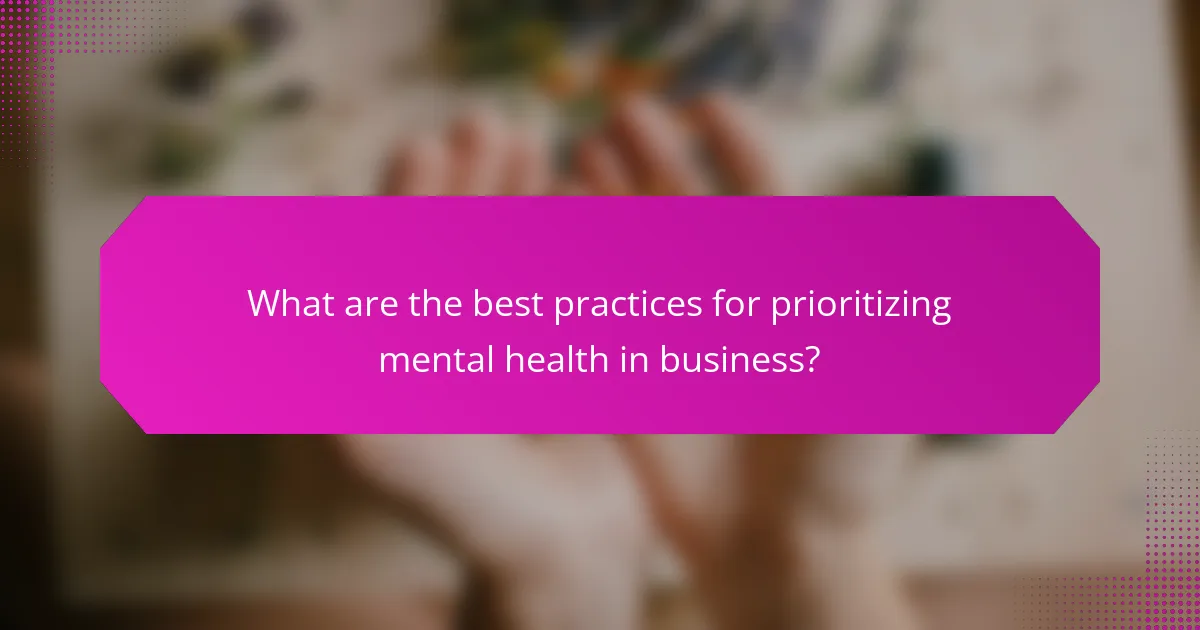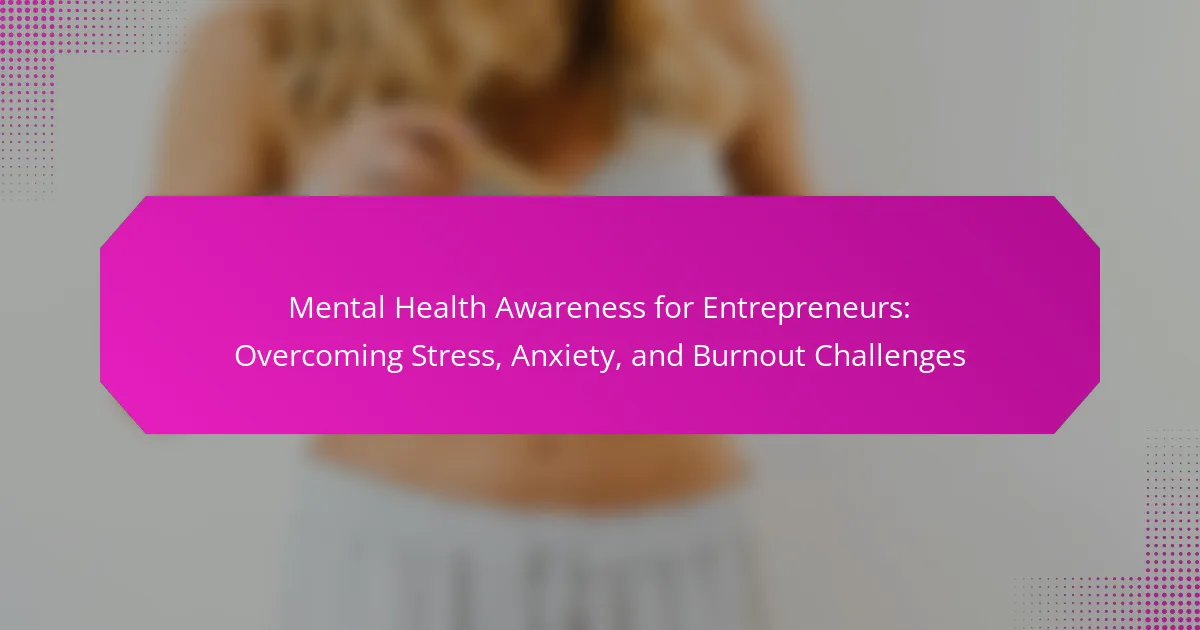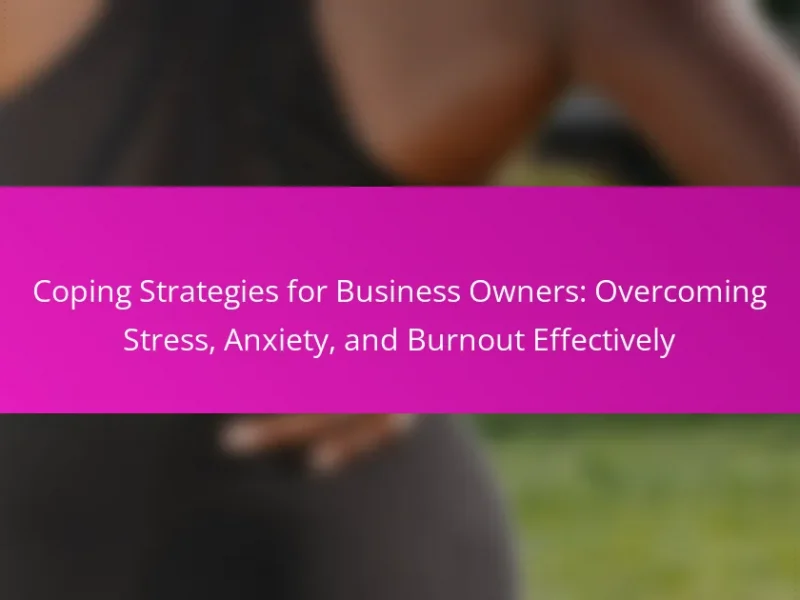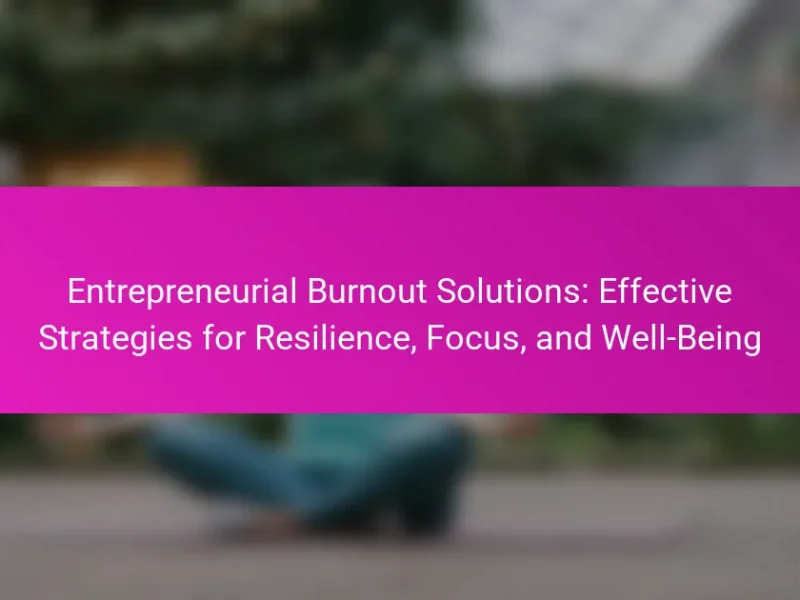Entrepreneurs often struggle with stress, anxiety, and burnout, which can impede their productivity and well-being. This article explores the prevalence of mental health issues among entrepreneurs, effective coping strategies, unique challenges faced by female entrepreneurs, and the importance of building supportive networks. It also discusses how to create a healthy work environment that prioritizes mental health and fosters resilience.

What are the common mental health challenges faced by entrepreneurs?
Entrepreneurs commonly face stress, anxiety, and burnout due to high demands and uncertainty. These mental health challenges can hinder productivity and overall well-being. Research indicates that 72% of entrepreneurs report mental health issues, highlighting the prevalence of these struggles. Stress often arises from financial pressures, while anxiety can stem from fear of failure. Burnout results from prolonged work hours and insufficient self-care. Addressing these challenges is crucial for sustaining both personal health and business success.
How does stress manifest in entrepreneurial environments?
Stress in entrepreneurial environments often manifests as anxiety, burnout, and decreased productivity. Entrepreneurs face unique pressures, including financial uncertainty and high expectations. These factors can lead to physical symptoms like headaches, fatigue, and sleep disturbances. According to a study, 72% of entrepreneurs report mental health challenges, highlighting the need for awareness and coping strategies. Managing stress effectively involves prioritizing self-care, seeking support, and implementing time management techniques.
What role does anxiety play in business ownership?
Anxiety significantly impacts business ownership by affecting decision-making and overall performance. Entrepreneurs often experience heightened stress due to financial pressures and uncertainty. This stress can lead to burnout and hinder productivity. Addressing anxiety through mental health awareness and coping strategies is essential for sustaining business success. Studies show that entrepreneurs who prioritize mental well-being report higher satisfaction and resilience.
How does burnout impact productivity and decision-making?
Burnout significantly reduces productivity and hampers decision-making. It leads to fatigue, decreased focus, and impaired judgment, which can result in poor choices and missed opportunities. Entrepreneurs experiencing burnout often struggle to prioritize tasks effectively, affecting overall business performance. Research indicates that over 50% of entrepreneurs report high levels of stress, which directly correlates with diminished output and creativity.

What are the universal coping strategies for managing mental health?
To manage mental health effectively, entrepreneurs can utilize universal coping strategies such as mindfulness, time management, and social support. Mindfulness practices reduce stress and enhance focus. Effective time management helps prioritize tasks, minimizing overwhelm. Building a strong support network fosters resilience and provides emotional relief. These strategies collectively promote mental well-being and combat challenges like stress, anxiety, and burnout.
How can entrepreneurs implement effective stress management techniques?
Entrepreneurs can implement effective stress management techniques by prioritizing self-care, setting boundaries, and practicing mindfulness. These strategies help mitigate anxiety and prevent burnout. Regular exercise, proper nutrition, and sufficient sleep are essential for maintaining mental health. Engaging in mindfulness practices, such as meditation or deep breathing, can enhance focus and reduce stress levels. Additionally, seeking support from peers or professionals fosters a healthy work environment and encourages resilience.
What mindfulness practices are beneficial for business owners?
Mindfulness practices beneficial for business owners include meditation, deep breathing exercises, and mindful walking. These techniques reduce stress, enhance focus, and promote emotional resilience. Regular meditation sessions, even for 10 minutes, can significantly lower anxiety levels. Deep breathing exercises help in grounding and calming the mind during hectic workdays. Mindful walking encourages physical activity while fostering a connection to the present moment. Incorporating these practices into daily routines can lead to improved mental health and overall well-being for entrepreneurs.
How can time management reduce anxiety levels?
Effective time management can significantly reduce anxiety levels by providing structure and control. Entrepreneurs often face overwhelming tasks, leading to stress. By prioritizing tasks and setting realistic deadlines, individuals can create a clearer path forward, minimizing feelings of chaos. Studies indicate that effective time management can decrease anxiety by up to 25%, as it fosters a sense of accomplishment and reduces procrastination. Additionally, scheduling breaks enhances mental clarity, further alleviating stress. Ultimately, mastering time management equips entrepreneurs to handle challenges with greater confidence and ease.

What unique mental health challenges do female entrepreneurs face?
Female entrepreneurs face unique mental health challenges, including isolation, self-doubt, and work-life imbalance. These issues often stem from societal expectations and lack of support networks. Studies show that 72% of female entrepreneurs experience anxiety, significantly affecting their business performance. Additionally, they may encounter difficulties in securing funding, leading to increased stress and burnout. Addressing these challenges requires targeted mental health resources and community support tailored to their specific needs.
How does societal pressure influence mental health in women entrepreneurs?
Societal pressure significantly impacts the mental health of women entrepreneurs, often leading to increased stress and anxiety. Women face unique challenges, including balancing professional and personal responsibilities, which can exacerbate feelings of burnout. Research indicates that 70% of women entrepreneurs report high levels of stress due to societal expectations. Additionally, the fear of judgment can hinder their decision-making, further affecting mental well-being. Creating supportive networks and promoting mental health awareness are crucial for overcoming these challenges and fostering resilience among women in entrepreneurship.
What support systems are available for female business owners?
Female business owners can access various support systems focused on mental health, stress management, and burnout prevention. These include mentorship programs, networking groups, and mental health resources tailored for entrepreneurs. For example, organizations like SCORE provide free mentoring, while platforms like the Women’s Business Enterprise National Council offer networking opportunities. Access to mental health professionals specializing in entrepreneurship is also crucial, as they understand the unique challenges faced by businesswomen. Additionally, online communities can provide emotional support and shared experiences, fostering resilience among female entrepreneurs.

What rare mental health issues might entrepreneurs encounter?
Entrepreneurs may encounter rare mental health issues such as bipolar disorder, dissociative identity disorder, and schizoaffective disorder. These conditions can significantly impact decision-making and stress management. Bipolar disorder is characterized by extreme mood swings, affecting productivity. Dissociative identity disorder involves fragmentation of identity, complicating interpersonal relationships. Schizoaffective disorder combines symptoms of schizophrenia and mood disorders, leading to challenges in maintaining focus and motivation. Awareness of these rare issues is crucial for creating supportive environments that foster mental well-being.
How can entrepreneurs identify and address imposter syndrome?
Entrepreneurs can identify and address imposter syndrome by recognizing their feelings of self-doubt and inadequacy. Acknowledge these emotions and understand they are common among peers. Engage in self-reflection to assess accomplishments and set realistic expectations. Seeking mentorship can provide perspective and guidance. Additionally, practicing self-compassion and focusing on growth can alleviate the pressure of perfectionism. Regularly celebrating small wins reinforces confidence and combats negative self-talk.
What are the signs of entrepreneurial burnout that often go unnoticed?
Entrepreneurial burnout often manifests through subtle signs that can be overlooked. Common indicators include chronic fatigue, diminished creativity, and irritability. Entrepreneurs may also experience a sense of isolation, loss of motivation, and difficulty concentrating. Recognizing these signs early can help in addressing mental health concerns effectively.

How can entrepreneurs build a supportive network for mental health?
Entrepreneurs can build a supportive network for mental health by connecting with like-minded individuals who understand their challenges. Engaging in peer support groups, attending industry events, and utilizing online platforms fosters relationships that provide emotional resilience.
Establishing mentorship relationships can create a unique attribute of guidance, helping entrepreneurs navigate stress and anxiety. Regularly sharing experiences in these networks enhances awareness and reduces feelings of isolation.
Moreover, incorporating wellness practices into networking events promotes a culture of mental health awareness. This can include mindfulness sessions or workshops focused on stress management.
To maximize benefits, entrepreneurs should actively participate and contribute to discussions, ensuring a reciprocal support system.
What role do mentorship and peer support play in mental well-being?
Mentorship and peer support significantly enhance mental well-being for entrepreneurs by providing emotional resilience and practical guidance. These relationships foster a sense of community, reducing feelings of isolation. Research indicates that entrepreneurs with mentors report lower stress levels and higher job satisfaction. Peer support groups can also offer accountability, improving coping strategies for anxiety and burnout. Engaging in these networks cultivates a unique attribute of shared experiences, which can be crucial for navigating the challenges of entrepreneurship.
How can networking events contribute to mental health awareness?
Networking events enhance mental health awareness by fostering community support and reducing isolation. They provide entrepreneurs with opportunities to share experiences and coping strategies. Engaging with peers can alleviate stress and anxiety, promoting a sense of belonging. Research indicates that social interaction significantly impacts mental well-being, making these events essential for addressing burnout.

What are the best practices for prioritizing mental health in business?
To prioritize mental health in business, entrepreneurs should implement supportive practices and create a healthy work environment. Key strategies include promoting open communication, providing mental health resources, encouraging work-life balance, and fostering a culture of support.
1. Establish open communication channels to discuss mental health openly.
2. Provide access to mental health resources, such as counseling services.
3. Encourage regular breaks and flexible work hours to reduce stress.
4. Foster a supportive workplace culture that values employee well-being.
Implementing these practices can significantly reduce stress, anxiety, and burnout challenges.
How can entrepreneurs create a healthy work-life balance?
Entrepreneurs can create a healthy work-life balance by setting clear boundaries, prioritizing self-care, and delegating tasks. Establishing specific work hours helps separate professional and personal time. Engaging in regular physical activity and mindfulness practices reduces stress and enhances mental well-being. Delegating responsibilities allows entrepreneurs to focus on high-priority tasks, reducing feelings of overwhelm. Seeking support from peers or mentors can also provide valuable insights and encouragement in managing stress and preventing burnout.
What common mistakes should entrepreneurs avoid regarding mental health?
Entrepreneurs should avoid neglecting self-care, ignoring signs of stress, and failing to seek support. Prioritizing mental health enhances resilience and productivity. Common mistakes include overworking without breaks, dismissing mental health issues as unimportant, and not establishing a work-life balance. These missteps can lead to burnout, impacting overall business success.
How can regular self-assessment improve mental well-being?
Regular self-assessment enhances mental well-being by fostering self-awareness and enabling proactive stress management. Entrepreneurs can identify triggers of stress, anxiety, and burnout through consistent reflection. This practice encourages the development of coping strategies tailored to individual needs, promoting resilience. Studies show that self-reflection reduces feelings of isolation, enhancing emotional support networks. Regular self-assessment ultimately cultivates a healthier mindset, improving overall productivity and job satisfaction.
What expert insights can guide entrepreneurs in managing mental health?
Entrepreneurs can manage mental health by prioritizing self-care, establishing boundaries, and seeking professional support. Regular exercise, mindfulness practices, and adequate rest enhance resilience against stress and anxiety. Studies show that 72% of entrepreneurs experience mental health challenges, highlighting the need for proactive strategies. Engaging in peer support groups fosters connection and shared experiences, which can alleviate feelings of isolation.


